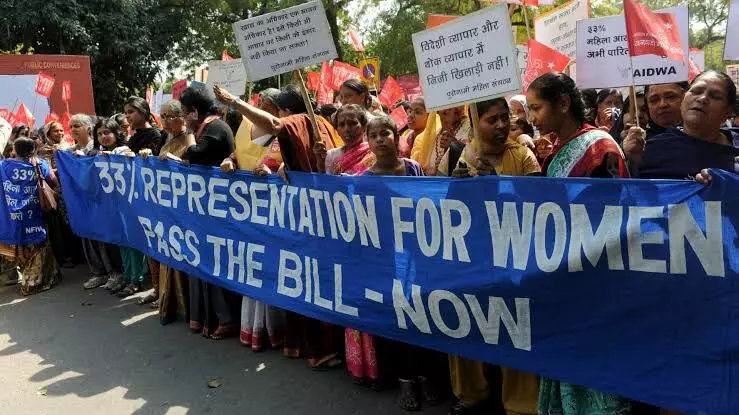Congress demands passage of Women’s Reservation Bill in Parliament; Kavitha slams delay
Women’s Reservation Bill become a slugfest between the Indian National Congress and the Bharat Rashtra Samithi
By Kaniza Garari
Hyderabad: Why has the Women’s Reservation Bill become a slugfest between the Indian National Congress and the Bharat Rashtra Samithi?
The Congress states that the WRB is their brainchild and it was introduced and passed by them in the Rajya Sabha. However, MLC K Kavitha from the BRS, who has been at the front of the agitation for the passage of the Women’s Reservation Bill in the Parliament, asked, “What is stopping the government from passing the bill in the Lok Sabha, when it has already cleared the Rajya Sabha in 1989? When the Congress party had ruled the country, why was it not taken up by them?”
This bill has led to a continuous barb of words between the two parties as both demand passage of the bill in the Parliament and its implementation in the upcoming elections.
What is the history of WRB?
The Women’s Reservation Bill is an amendment in the Constitution of India to reserve one-third of all seats in the Lower House of Parliament i.e. Lok Sabha, and all the state Legislative Assemblies for women.
The Women’s Reservation Bill was first introduced by Rajiv Gandhi in 1989. The first Constitution Amendment Bills, introduced in May 1989, were for one-third reservation in panchayats and nagarpalikas. It was passed in the Rajya Sabha but could not be passed in the Lok Sabha.
Later, former prime minister PV Narasimha Rao reintroduced the Constitution Amendment Bills for one-third reservation for women in panchayats and nagarpalikas in April 1993. Both bills were passed and became law.
The total number of elected women representatives due to this bill is now 15 lakh elected representatives. Former prime minister Dr Manmohan Singh introduced the Constitution Amendment Bill for one-third reservation for women in the Parliament and state legislatures. The bill was passed in the Rajya Sabha on March 9, 2010. However, it was not taken up in Lok Sabha.
CWC resolution on WRB
The Women’s Reservation Bill is also one of the resolutions from the Congress Working Committee (CWC) meeting held in Hyderabad on September 16. A demand has been placed that the WRB must be passed in the special session of the Parliament. Jairam Ramesh, a senior leader of the Congress party, during the Hyderabad meeting, told the press, “We are very clear about the bill. Government must introduce it in the Lok Sabha and pass it.”
What is the actual situation?
While the bill was passed for nagarpalikas and panchayats, the elected women are mostly represented by their husbands who take charge of the office and enjoy the power.
Varsha Bhargavi, director of the Where are the Women’s Collective, explained, “Women's representation must not be symbolic. Women must yield power and be the actual decision-makers. This is not seen in the lower rungs of governance. Why are they not able to make decisions on their own? Tokenism is not going to work, there must be a real transfer of power.” Bharagavi explained, “Take the case where a woman education minister, P Sabitha Indra Reddy, could not sanction Rs 5 crores to save Kamala Nehru Polytechnic for Women’s College. Where is the real power for them to make a decision?”
In the Lok Sabha, there are 78 women members of the total 542 members. These women representatives are not able to raise issues as required. “It is ironic that women do not raise issues related to women in the Parliament. These lacunae leave a lot to be said about the ability of the women to take up issues that affect them the most,” she said.
While the Women’s Reservation Bill is becoming a political tool, the main question is: will it really bring in the required change for women and give them real power or will it become another proxy rule for men?